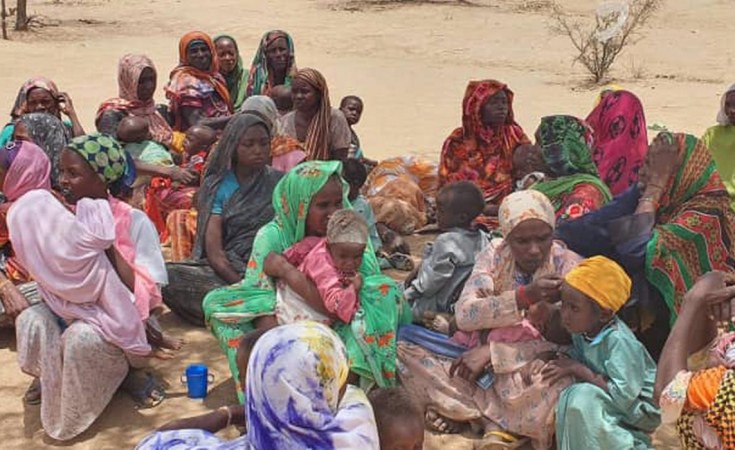The UN High Commissioner for Refugees has warned that without concerted peace efforts in war-torn Sudan, people will continue to flee to neighbouring countries. Filippo Grandi's comments came ahead of World Refugee Day Thursday, when he highlighted the desperate plight of millions of refugees and internally displaced people across Africa.
The International Organisation for Migration (IOM) this month recorded 9.9 million internally displaced people (IDPs) in Sudan.
Prior to the war, there were already 2.8 million IDPs, more than two million of which were in neighbouring countries such as Egypt and Chad.
The UNHCR and IOM has been working to address the needs of South Sudanese refugees unable to return home since the end of the civil war in February 2020, as well as those fleeing Sudan's civil war, which broke out in April 2023.
"The picture is rarely as desperate as where I am now in Jamjang, South Sudan," Grandi said in a statement issued from the border between the two countries.
"In recent months nearly 700,000 people have crossed from neighbouring Sudan, fleeing a devastating war that has taken their homes, their loved ones - everything."
"All I want now is to go back home." Many like Marko, displaced multiple times due to conflict in Sudan, hope to reunite with family and friends when they arrive the South Sudan - Sudan border. IOM assists them in reaching their final destinations. pic.twitter.com/e6efUH6xbi-- IOM South Sudan (@IOMSouthSudan) May 18, 2024
Some fled long ago to escape South Sudan's civil war, and now they are being forced back to a place still struggling to recover from years of fighting and famine, he said.
"Others are Sudanese - teachers, doctors, shopkeepers and farmers - who must now navigate life as refugees"
Grandi's comments were made at a settlement where the UNHCR and IOM are struggling to support refugees and displaced people on both sides of the border.
"Last year in April, we started to see a significant number of returnees," the IOM's emergency coordinator for Sudan, Aaron Adkins, told RFI.
The main challenge for the UN has been to secure transport for the returnees and to make sure they are safe.
"Luckily, the South Sudanese returnees and the Sudanese refugees have often been able to travel and communicate together peacefully," Adkins said.
Record 120 million people forcibly displaced worldwide, UN says
Mauritania's progress
In Mauritania, where 91,000 Malian refugees have been fleeing violence for over a decade, the situation is more optimistic.
"Mauritania is much more stable than the rest of the Sahel," said Maribeth Black, who heads the World Food Programme (WFP) in the country.
"It has also been a leader not only in Africa but beyond in terms of welcoming refugees."
The WFP sends money to people so they have the flexibility to choose what they need and when they need it. While most spend the money on food, it's also used to pay medical bills, rent and school fees.
"The government of Mauritania has been a great driver in terms of accepting refugees as part of the population," Black said.
"Refugees have access to social programmes, healthcare schemes and cash transfers that help them to provide for themselves."
A new goal is live! Share meals with families in Africa's Sahel region 🌍☀️In #Chad, #Niger and #Mauritania @WFP is helping refugees and providing emergency cash, school meals and nutrition support to communities and farmers.Share meals and help people support themselves 💛 pic.twitter.com/tZTTh5LdDp-- ShareTheMeal - UN World Food Programme (@ShareTheMealorg) June 18, 2024
Most Malian refugees in Mauritania are in the arid southeast Hodh Chargui region, in the Mbera camp - which has become the third largest "town" in the country.
The number of refugees from Mali has been steadily increasing since 2012.
Black said Mauritania should inspire other countries hosting refugees in sub-Saharan Africa and even further afield.
Due to political instability, the impacts of climate change, and ongoing humanitarian challenges in the Sahel region, UNHCR projects that the refugee population in Mauritania will increase from to 246,000 by 2026.
Forced displacement surged to historic new levels across the globe last year, according to the UNHCR's 2024 Global Trends Report.
"Behind these stark and rising numbers lie countless human tragedies," said Grandi. "That suffering must galvanise the international community to act urgently to tackle the root causes of forced displacement."


